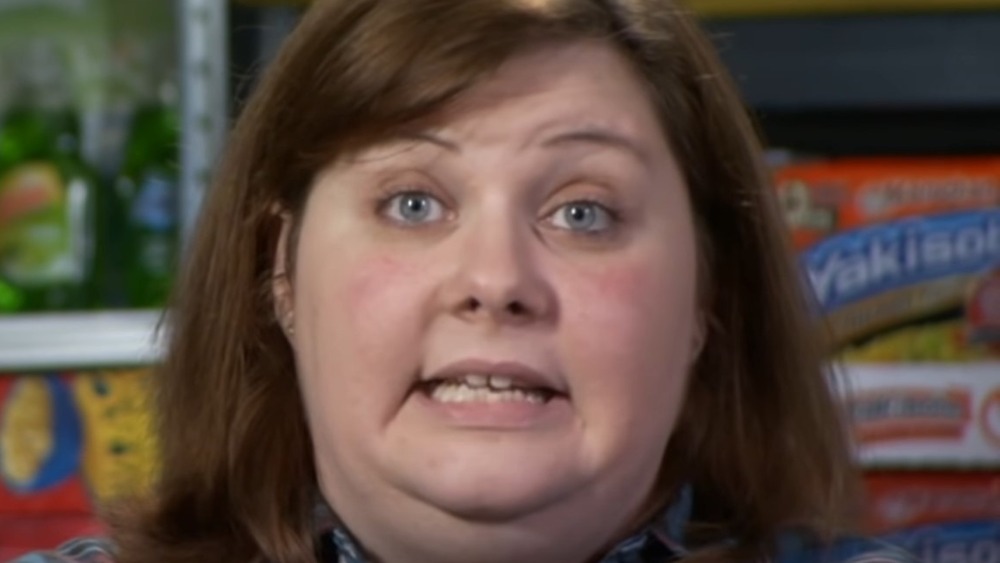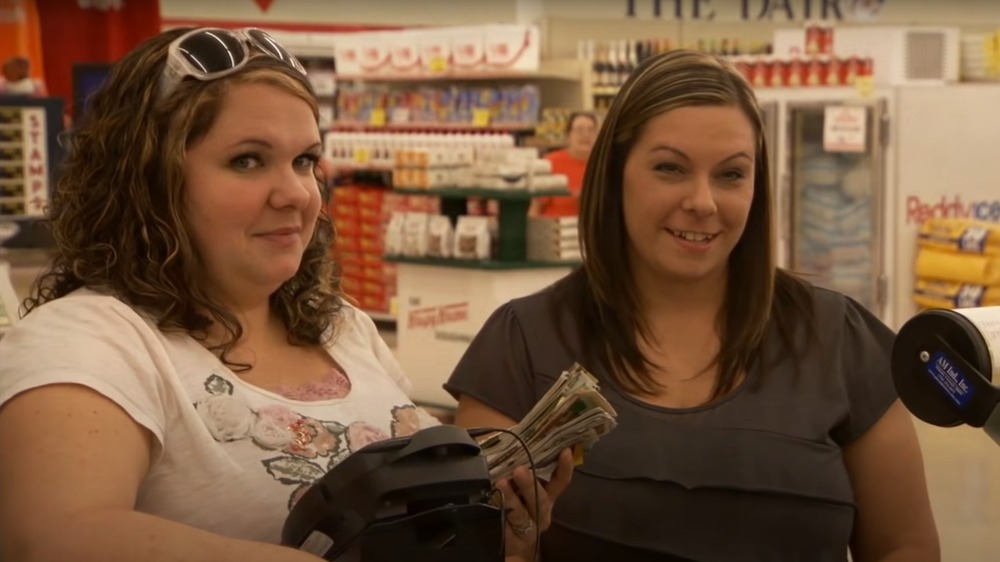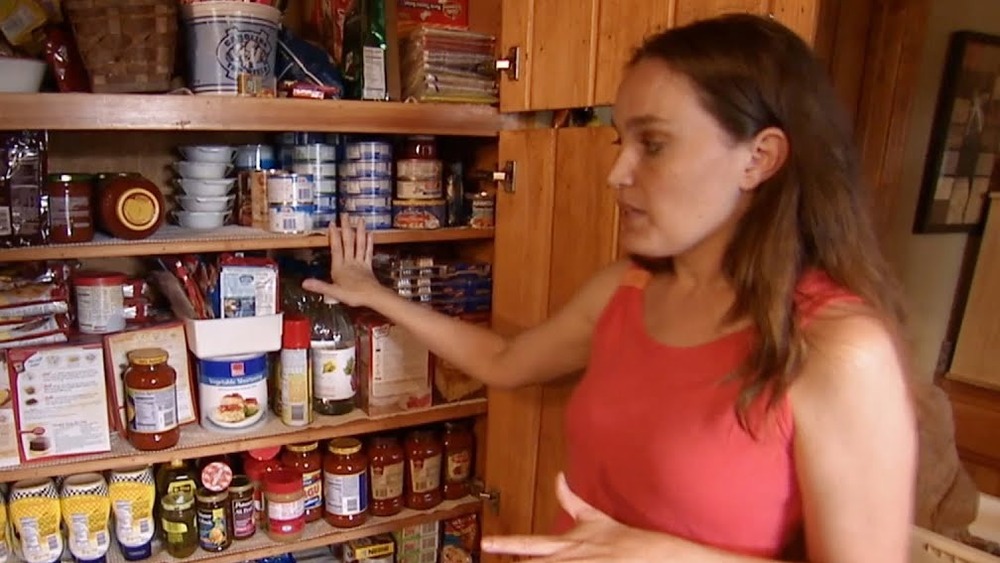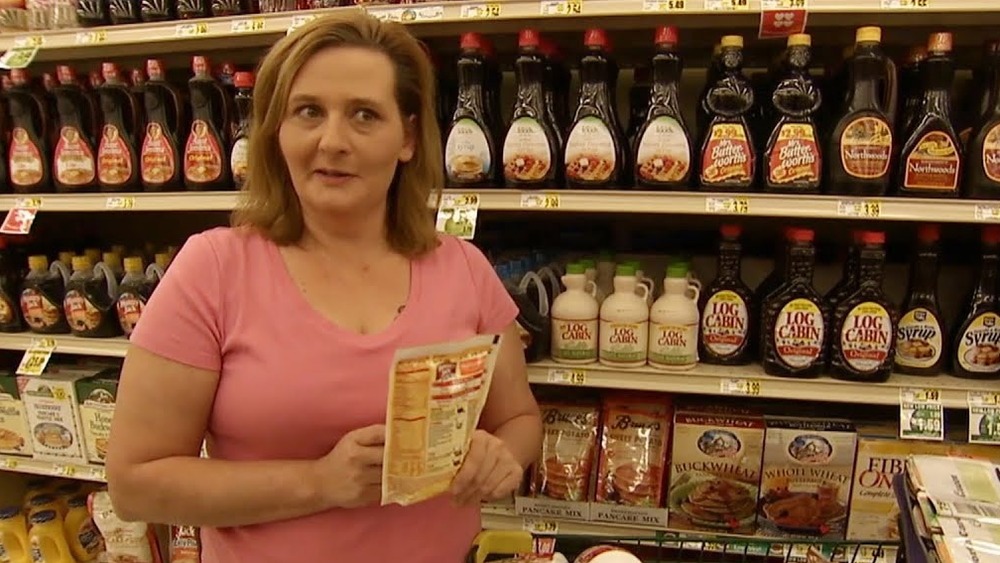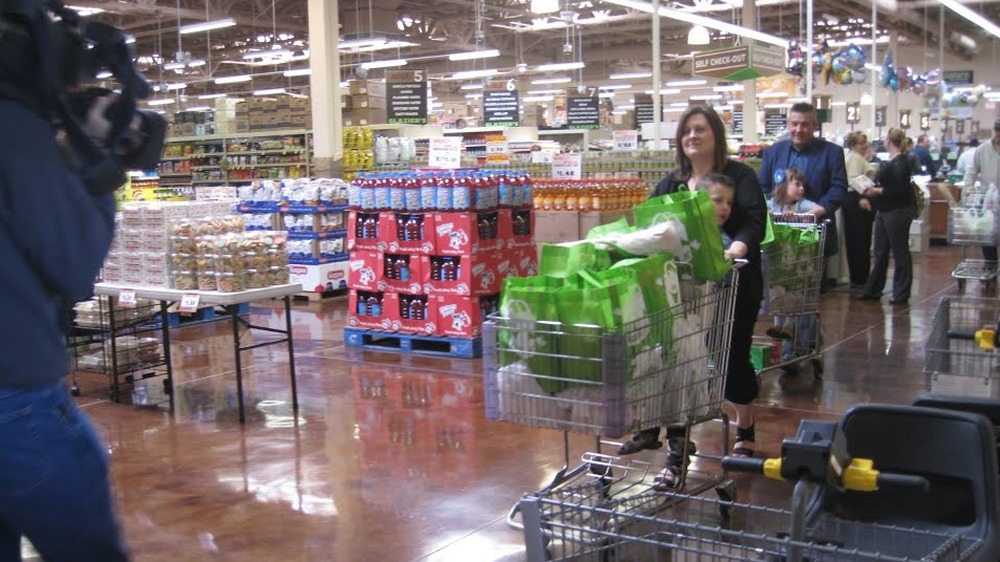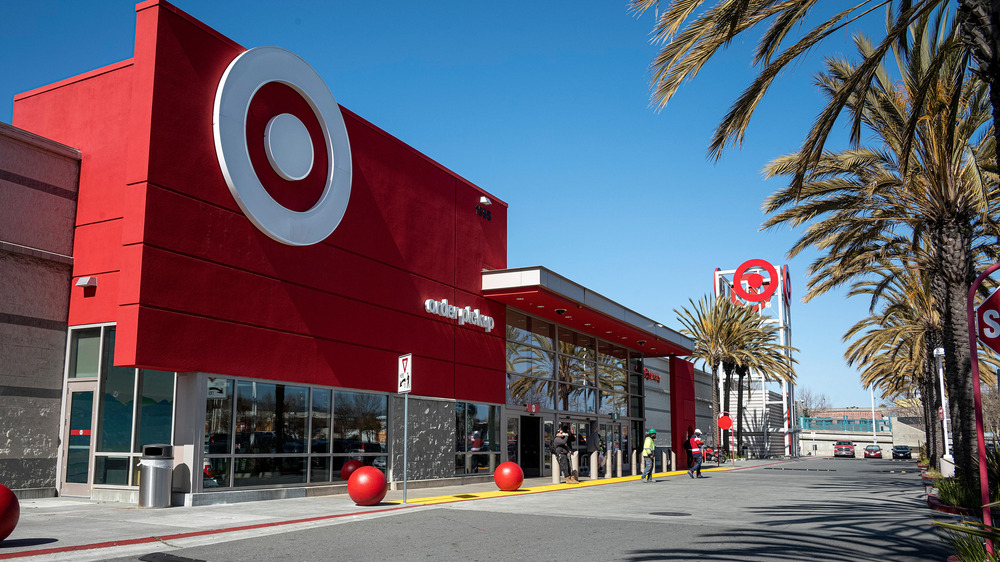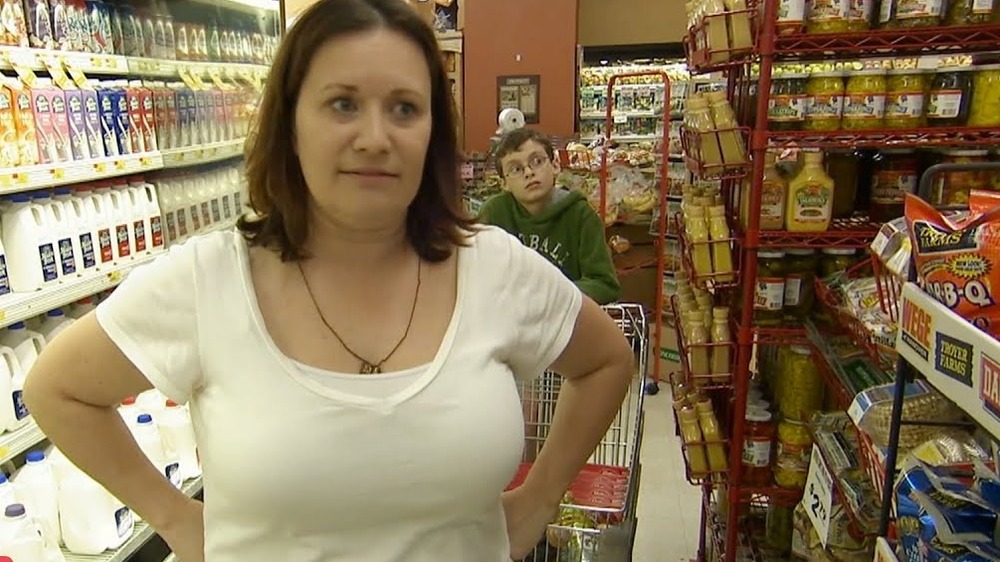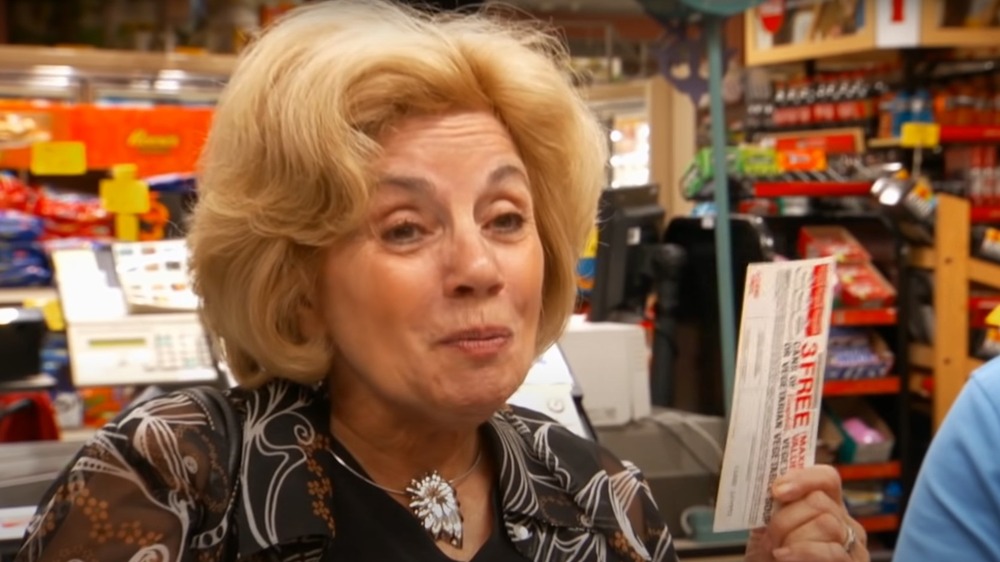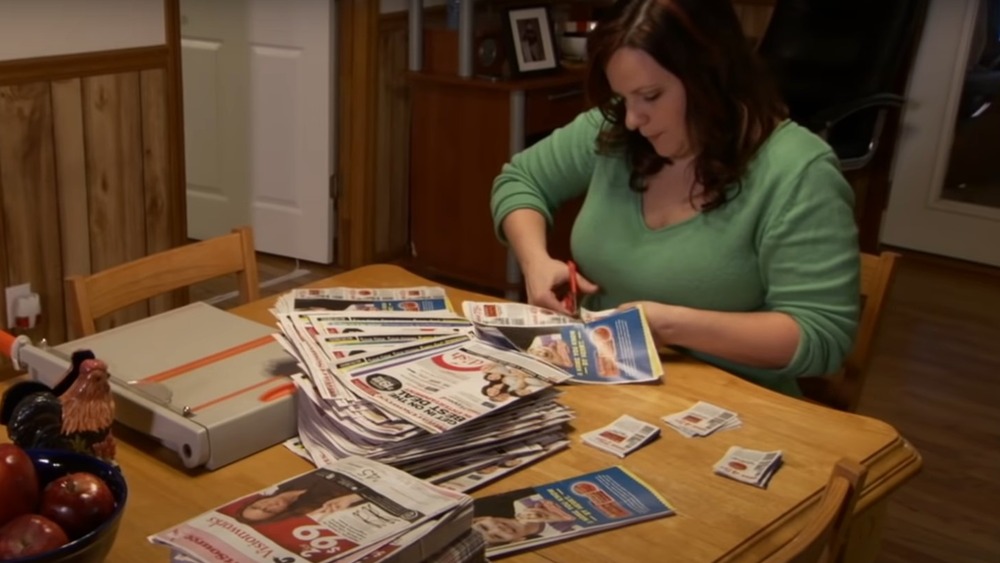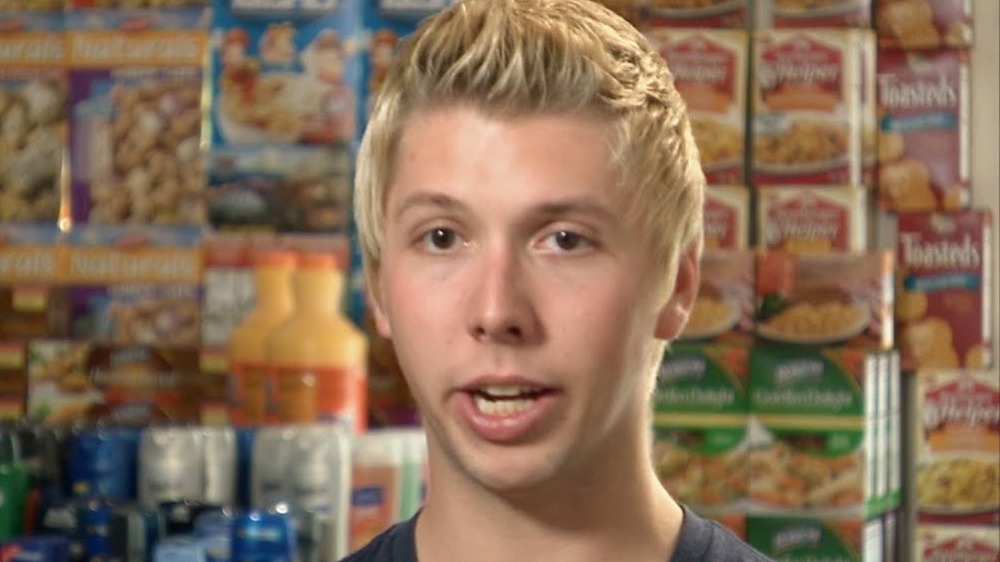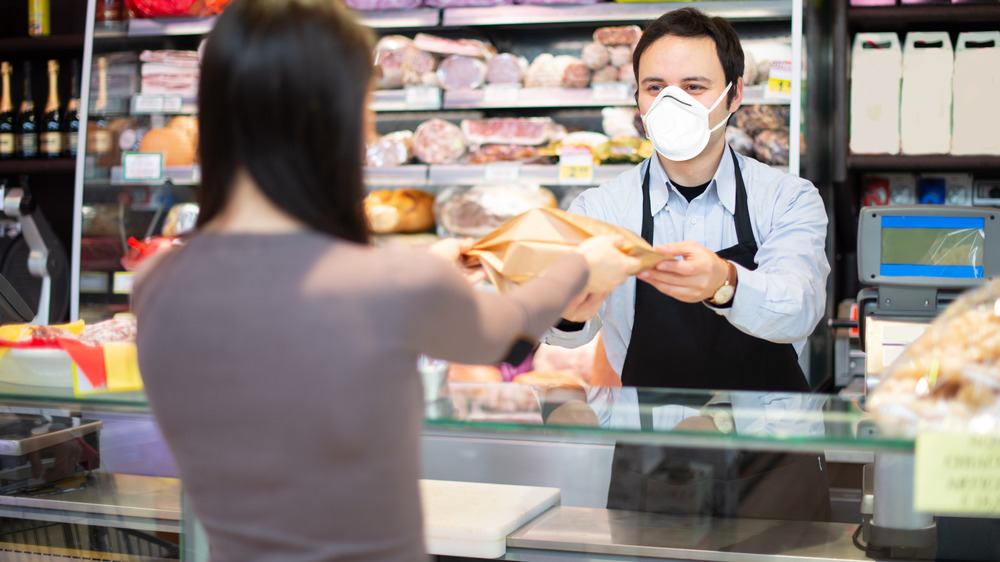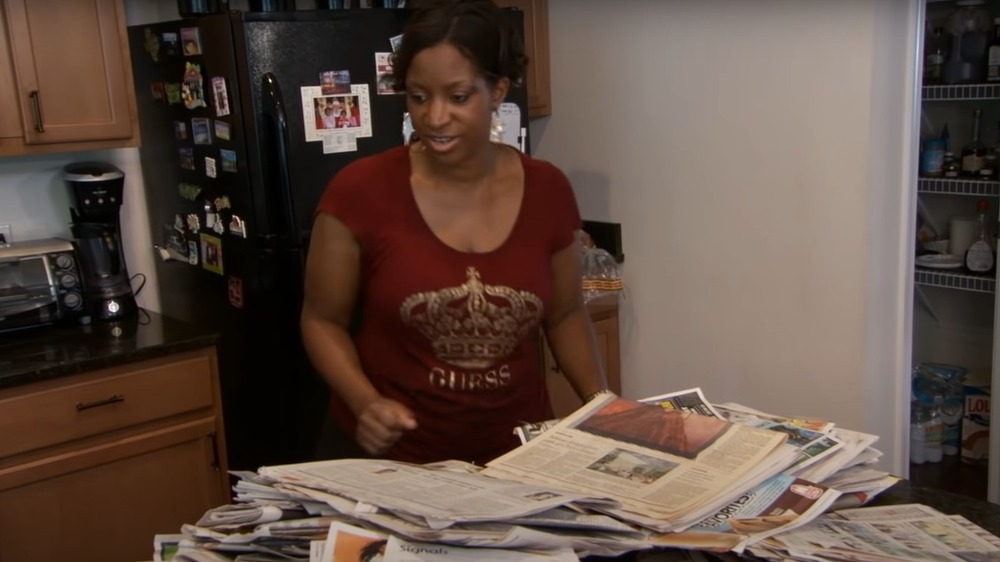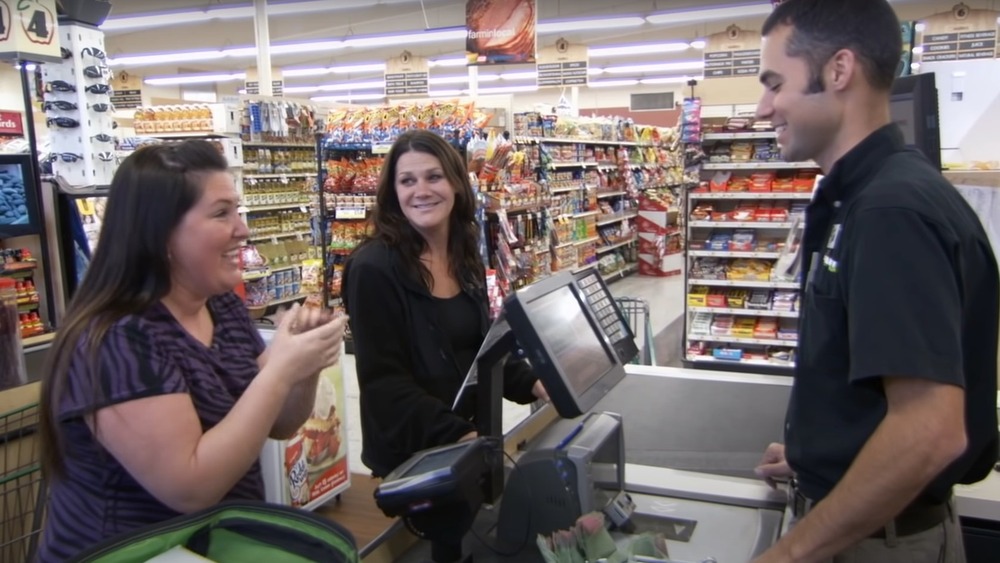The Truth About TLC's Extreme Couponing
Whether you're a fan of Extreme Couponing or Marriage or Mortgage, there's nothing quite like reality television. Watching people live their lives on camera, especially when they're experiencing strange and unusual situations, is seriously addicting. It's why shows like 90 Day Fiancé or The Bachelor are so popular — people love to see other people express real emotions and struggle in ways that are relatable. That said, sometimes reality shows, such as Extreme Couponing, aren't exactly all that real.
Specifically, if you were to look for the truth about TLC's Extreme Couponing, you might be surprised at what you'd discover. The series — which follows people all over the United States as they clip coupons, plan their grocery store trip, and then hand their binder of coupons over to the clerk as their total drops to staggering amounts — doesn't show just how extreme extreme couponing is. In fact, the series glosses over a few important details about couponing. It's really not as easy as the people on the show make it out to be. More than that, there's somewhat of a dark side to extreme couponing, and that might shock you.
Extreme Couponing doesn't address how long it takes to become a couponing pro
When you watch an episode of Extreme Couponing on TLC, you usually meet a person or two who have practically become professionals in the art of getting a good deal at the grocery store. But while they might have entire binders of coupons they've collected and they may talk about the research they conduct each week to find the best coupons before heading to the store, they don't really talk about how long it takes to learn how to become an efficient extreme couponer.
If you've never couponed before, and even if you have, getting used to couponing and compiling enough to actually save the kind of money you see on TLC takes time. According to The Philadelphia Inquirer, the actual process of couponing typically takes a very long time to organize and understand before you actually start to see any significant savings. In fact, extreme couponer Stacy Fout told the publication that she had only recently reduced her prep time to between four and six hours per week after clipping coupons for six years. "If you're not strategic in planning it, you can spend more gas than it's worth," she said of planning what coupons you'll use before going to the store.
Couponing isn't all it's cracked up to be
Even though TLC's Extreme Couponing shows people with their own personal grocery stores in their garages (yes, really), that doesn't mean that it's something you would actually want. Really, couponing isn't always all it's cracked up to be, and in fact, it can even end up being a waste of time.
According to ex-extreme couponer Christy Rakoczy, the decision to to give up couponing came when she realized what she was really doing. "The goal wasn't just to buy products — the goal was to use the coupons to get products for free," she wrote in an article on Money Crashers. But while she was able to receive free products, she didn't need them — and she often had to spend money on other products in order to qualify for the coupon. She explained, "The coupon craze created an incentive to buy unnecessary goods. While I could resell them (and sometimes did), they often sat on shelves in my house for weeks or months, taking up space."
Couponing as seen on TLC's Extreme Couponing can often lead to a stockpile of unnecessary items, something that can be a huge waste of time and precious cabinet space.
Some people like those seen on Extreme Couponing actually spend money on coupons
Obviously, with a title like Extreme Couponing, there's an implication that the people on the show are pretty intense about their coupons, and they definitely are. But what the series doesn't tell you is just how all the extreme couponers actually get those huge stacks of coupons. Sure, there are free flyers in the mail, and newspapers and manufacturers' websites typically have coupons in them. But what you might not know is that a lot of couponers pay money for coupons.
According to Money Crashers, it's not uncommon for extreme couponers to buy multiple copies of their local newspapers just to get plenty of coupons. Obviously, if you're spending dollars per day for newspapers' coupons, it cuts into your savings, but that's not the only cost involved. Many couponers will drive to multiple grocery stores to get the best deals, even to stores that are out of town, and this ends up costing plenty in gas.
People might actually spend more money when using coupons
For many people, to watch even just one episode of Extreme Couponing is to step foot into a new world. A world where people bring stacks of coupons to the store, to sometimes have the store owe them money when the cashier is done ringing everything up. But it's important to note that not only is that outcome very rare, sometimes (especially for people who don't want to spend hours each week clipping coupons) couponing costs more than it's worth.
Specifically, as The Washington Post reported, a study entitled "Spending More to Save More: The Impact of Coupons on Premium Priced Products" concluded, "Three studies show that coupons for premium-priced products can actually make consumers spend more money than they would have spent in the absence of [a] coupon." And it's true — just think about it. If you've ever seen a coupon for something like organic berries or an expensive brand of makeup, it might look enticing, but would you have even thought to buy that item before the coupon? Typically, couponing can actually result in people spending more money, all at the prospect of a good deal.
Despite what you may see on Extreme Couponing, not all stores will double coupons
On just about every episode of Extreme Couponing, you will hear a couponer talk about "doubling" or "stacking" their coupons as a way to multiply their savings. But as intriguing as that looks on television, it's not entirely realistic, as not all stores will double coupons for you.
According to a CBS News article published in 2011, the same year TLC's Extreme Couponing premiered, at least two major stores altered their coupon policies to prohibit customers from trying to get the kind of savings seen on the show. Specifically, Rite Aid stopped allowing customers to combine multiple buy-one-get-one-free coupons and limited the number of identical coupons a shopper could use to four if there's enough stock. On their part, Target started to prohibit "stacking" coupons, in which customers would use both a store and manufacturer coupon to get two items for free.
Clearly, Extreme Couponing sent more couponers to stores to try to take advantage of savings, but these deals don't really exist outside of reality television.
Not all couponing on TLC's Extreme Couponing is legal
A lot of people who watch TLC's Extreme Couponing probably thought to themselves at one point that the show seemed too good to be true. And in some cases, they're spot-on with that observation. Because not only is the extreme couponing ridiculous, but there are times when it's not even legal. Sometimes the people on the series use fake or counterfeit coupons to score those amazing deals you see.
In fact, the nonprofit Coupon Information Center expressed some concern about the way things were represented on Extreme Couponing. According to Time, the CIC requested that TLC "address potentially illegal acts that appear to have been portrayed on the show" that "appears to portray coupons being used in violation of the terms and conditions printed on the coupons." As Time noted, a 16-year-old on the show had been seen using about three dozen counterfeit coupons to snag over 400 rolls of toilet paper; his mother had to later pay the store for the toilet paper.
So, even though Extreme Couponing might make it seem like scoring a ton of items for free is normal, it's really not, and it could possibly even be illegal.
Many stores changed their policies when Extreme Couponing filmed
On TLC's Extreme Couponing, there are certainly moments that seem pretty plausible. A person using a buy-one-get-one-free coupon or a half-off coupon to score some major savings doesn't seem all that strange or hard to do. But as it turns out, many of the coupon strategies that are used on Extreme Couponing wouldn't actually happen in real life because the stores would never allow them to.
According to The Philadelphia Inquirer, a lot of times when you see people on Extreme Couponing able to get their totals at checkout to drop to astonishingly low numbers, it's because the store that they're at has adjusted its coupon policies while filming. In fact, some stores that appeared on Extreme Couponing changed any coupon policies they might have had, such as not allowing customers to double coupons or putting limits on how many coupons can go towards one item, in order to give the show the shock value it's known for.
Non-extreme couponers don't appreciate TLC's Extreme Couponing
Obviously, when you watch a reality series with the word "extreme" in the title, you expect things to be a bit out of the ordinary. And on Extreme Couponing, the savings certainly seem implausible — they're a little too good to be true. Because of that, people who actually do coupon on a regular basis weren't exactly pleased with how Extreme Couponing depicted their tactics to save money.
One reporter wrote a piece for The News & Observer (via Time) to berate how Extreme Couponing made regular couponers look bad and to share how unrealistic the show was. "Shopping in the manner depicted on this show is darn near impossible to do in 'real life,'" they wrote, adding that "the shoppers featured on this show were allowed to pre-order items and tell the stores exactly what they would need. It would be darn near impossible for a regular, not-on-TV couponer to walk into a store and buy 100 of one item." Extreme Couponing definitely made ordinary couponers upset and for good reason.
Extreme Couponing stopped making new episodes in 2012, but people still watch reruns
Though TLC's Extreme Couponing is pretty popular and has quite a wide audience, it actually hasn't released any new episodes in years. Yes, you might still catch episodes airing on TLC, but they aren't new. Whether that's because of poor ratings or poor audience reaction, the exact reason is unknown. What is known is that Extreme Couponing was pretty short-lived.
While the show premiered in 2011 and technically lasted four seasons, the most recent episodes came out in 2012, so it was only around for about a year and a half. Still, like any show that hasn't been on the air for a while, people still watch reruns of Extreme Couponing regularly. Specifically, as the Leaf Chronicle pointed out, many times people will see a rerun of Extreme Couponing and, having never seen the show before, are shocked at the savings depicted. But of course, those savings aren't always real.
Stores have regretted filming Extreme Couponing
Because TLC's Extreme Couponing filmed at different areas all over the United States, it showed a variety of grocery stores at which couponers shopped. While in the real world each store might have different coupon policies, in the Extreme Couponing world, it seemed as if there were no policies at any stores, something those stores have mostly come to regret.
According to the Leaf Chronicle, one store seen on the show, Lowes Foods, actually put out a response to the confusion from shoppers about their coupon policies. "While we cannot undo our participation in the taping of Extreme Couponing what we can do is share with you ... some of what appears in the clip you saw was staged by the production company," the statement read, noting, "We definitely made a poor decision by participating in the show." Clearly, stores struggled with the aftermath of appearing on the series, and that couldn't have helped with ratings or a possible renewal for the show.
Extreme Couponing reportedly led to a rise in coupon theft
Even though Extreme Couponing was on the air for a short amount of time, the reaction it got out of viewers was seriously intense. So intense, as it turns out, that it actually led to a rise in coupon theft, specifically from newspapers that tend to hold the most valuable coupons. According to Tuscon.com, staff from newspaper publishing company McClatchy Newspapers realized all coupons from the copies of a Sunday print of Idaho Statesman had been taken without anyone paying for all the papers.
Fabulessly Frugal co-owner Cathy Yoder told Tuscon.com that she was positive the TLC series had caused people to believe they too could save hundreds of dollars in one grocery trip, but only if they had enough coupons. "I think there were people who did it beforehand, but it's been heightened," Yoder said. "People think they have to keep up with the Extreme Couponing thing. It's not normal, it is not reality. They just did it for the show, for the hype. It is obnoxious."
People who've appeared on Extreme Couponers claim it's scripted
As tends to be the case with most reality shows, TLC's Extreme Couponing doesn't appear to be as real as it would claim. Sure, it features real people buying real products from real stores, but it's reportedly also pretty scripted. And it doesn't sound like show producers were just trying to keep the show moving and making sure that the people on the show didn't say anything inappropriate on camera.
According to the Leaf Chronicle, one former Extreme Couponing participant explained that their whole episode was all pretty fake when they blogged about their experience on the TLC series. "The entire show is scripted," the Extreme Couponing star alleged. The producer handed us coupons to give them and told us what to say." They continued, "Totally fake. Sorry if it ruins it for anyone." We have to admit that's a little disappointing to hear.
